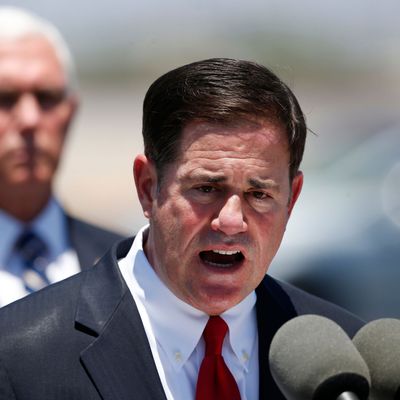
A recent compendium of presidential and gubernatorial job-approval data related to the handling of COVID-19, released by a consortium of four universities, mainly drew attention for showing that Donald Trump is getting lower marks for pandemic management than governors in 49 out of 50 states (the exception being Arizona, where respondents are unhappy with both Trump and Governor Doug Ducey).
But a look at just the governors shows the political folly involved in the hasty “reopening” decisions they pursued in May and June, particularly in Republican-governed states where COVID-19 mitigation efforts were imposed reluctantly and tardily in the first place.
It’s true there has been a general (though not universal) erosion of job-approval numbers for governors regarding their handling of the pandemic, which is unsurprising given the suffering and fatigue that have accompanied a public-health emergency that has lasted longer than most people anticipated. The consortium collected COVID-19 job-approval ratings in late April, early May, late May, and late June and found that they had declined between April and June in 45 of 50 states.
Ducey suffered the most calamitous loss of popularity, as his COVID-19 approval rating dropped from 56 percent in late April — before he issued an array of orders relaxing restrictions on businesses and public gatherings — to 32 percent in June, when the current massive spike in new cases was well under way.
Another early-and-active reopener, Texas governor Greg Abbott, saw his COVID-19 approval rating drop from 60 percent in April to 44 percent in June. It’s probably even lower now after a couple of weeks of terrible news about new cases in the state’s major cities.
Two other governors who caught heat for a slow initial reaction to the coronavirus followed by a hasty reopening have seen their relatively low approval ratings persist and intensify. There’s Florida’s Ron DeSantis, whose approval number was 46 percent in April and then 51 percent in late May before falling to 43 percent in late June as new cases began to spike and spread. As with Abbott’s, DeSantis’s current popularity is probably lower now. Georgia’s Brian Kemp saw his COVID-19 approval rating drop precipitously from 53 percent to 33 percent between late April and early May, as he became one of the nation’s most avid reopeners (alarming even Donald Trump). When new cases did not rise immediately, Kemp’s approval numbers rose modestly to 43 percent by late June, but now that new cases are taking off, you can expect his popularity to suffer accordingly.
Still another Republican governor who was damaged as much by a slow and limited response as a hasty reopening is Iowa’s Kim Reynolds, whose COVID-19 approval rating dropped from 52 percent in late April to 36 percent in early May, as she refused to issue a statewide stay-at-home order.
Governors who responded quickly and firmly to the pandemic but then began the reopening process are losing popularity and backpedaling as hot spots appear; nevertheless, they had a lot more political capital to burn than those who were slow to deal with the crisis from the start. California’s Gavin Newsom saw his coronavirus approval rating drop from 70 percent in late April to 58 percent in late July. And governors who remained firm on lockdown orders and saw the pandemic abate have done quite well. Michigan governor Gretchen Whitmer’s COVID-19 approval rating has risen from 62 percent in late April to 69 percent in late June; New Jersey governor Phil Murphy’s has risen from 65 percent in April to 66 percent in June; and New York’s Andrew Cuomo has experienced a marginal drop from his sky-high 70 percent in April to 65 percent in June.
Between the low and deteriorating public estimation of Trump’s handling of the pandemic and the trouble experienced by some of Trump’s Republican acolytes who have shared his eagerness to reopen, the lessen is pretty clear: From the viewpoint of public health, economic stability, and even pure politics, keeping a lid on activities that spread COVID-19 is the smart and right thing to do for the immediate future.






























